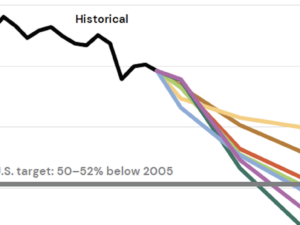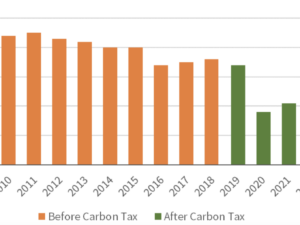By Steve Valk
As 2021 unfolded, Citizens’ Climate Lobby saw a window of opportunity had opened to enact a price on carbon, as legislation to rein in climate change became a top priority.
Due in great part to CCL’s steadfast advocacy for a carbon fee and dividend over the years, carbon pricing started to get serious consideration in the mix of policies emerging in a package of climate solutions. CCL immediately started pulling political will levers — lobbying, media, outreach, and grasstops engagement — to bolster support for the policy.
With the media lever, CCL volunteers rose to the challenge, getting 689 op-eds (so far!) published along with 2,268 letters to the editor. One type of media action that produces a big impact is newspaper editorial endorsements. Throughout the year, CCL volunteers have asked papers to publish editorials that support the inclusion of carbon pricing in the reconciliation bill. Because these editorials represent the official view of the newspaper — and because politicians seek newspaper endorsements when they run for re-election — they carry considerable weight with decision-makers in Congress.
As Senate Democrats head into 2022 ready to negotiate the final details of the Build Back Better bill, a price on carbon is still on the table, and newspaper editorials keep the pressure on lawmakers to include this essential tool.
Here are some of the editorials we’ve seen around the country:

For nearly a decade, CCL has engaged with The Washington Post about carbon fee and dividend, and the Post has written numerous editorials in support of a tax on carbon with revenue returned to households. Their most recent editorial on climate policy — “President Biden’s pen is not enough to fight climate change. Congress must act.” — includes another plea to price carbon:
“Democrats seek to pass a sweeping, nearly $2 trillion social spending and climate package. The version that the House approved last month contained some $500 billion for global warming initiatives, including a $320 billion tax credit program that would drive renewables deployment… In fact, Senate Democrats should aim to make the policy more, rather than less, ambitious. Instead of merely subsidizing clean energy, they should put a stiff and rising tax on carbon-intensive fuels, then reinvest the proceeds into energy research, efficiency initiatives and rebates to consumers.”

CCL’s North Carolina Coordinator Bill Blancato has developed a great relationship with the Winston-Salem Journal. The paper has published numerous op-eds from Bill and expressed support for carbon fee and dividend in editorials several times. Last month, Bill reached out to the editor suggesting this would be a good time for Journal to weigh in on the climate provisions for the reconciliation bill. On Nov. 20, the paper published the editorial “Back in the climate game,” which argued for a carbon price:
“More must be done to halt and reverse the policies and practices that contribute to the greenhouse effect that’s raising our planet’s temperature and putting more climate-churning heat and moisture into the air. No matter what else we do, if we don’t eliminate the causes of climate change, deadly and chaotic events will increase and more people will die…Systemic changes are required for our survival. But those changes don’t have to be painful. Options include a well-regarded, bipartisan carbon-pricing proposal that could put money in Americans’ pockets while reducing carbon emissions.”

At the Iowa City Press-Citizen, the editorial board is composed of people in the community, and CCL volunteer John Macatee is one of those board members. John made his pitch to the board, and on Oct. 28 the Press-Citizen published an editorial, “Carbon pricing needs to be in reconciliation bill to stop climate change.”It covered all the bases in making the case for price on carbon. Here’s a snippet:
“The reconciliation bill needs to reduce carbon emissions 50% by 2030, in line with the commitment President Joe Biden made earlier this year… The most effective way to reduce carbon emissions, confirmed by many studies, is a carbon tax assessed on fossil fuels at the source, like a wellhead or mine. This will make fossil fuels less competitive than cheaper green renewable energy alternatives, including wind and solar. A price on pollution will accelerate the shift to climate-friendly energy sources throughout the U.S. economy.”
In Grand Junction, Colorado, CCL volunteers have talked to editors at the paper over the last few years, and the paper has supported carbon fee and dividend in editorials. CCLer Aaron Hoffman suggested this would be an opportune time for another editorial supporting carbon pricing, and the newspaper agreed, publishing “Policy would help on climate” on Oct. 24:
“Right now greenhouse gas emitters are getting a free ride, a subsidy on their pollution that will be paid by our children and grandchildren to mitigate the effects of climate change. Charging emitters a fee (small at the outset, becoming increasingly painful over years) corrects this market failure… While the chances of a Republican backing the Build Back Better bill are basically zero, [Sen.] Manchin may appreciate the history of bipartisanship around this policy proposal… A carbon fee and dividend program has not been added into the Senate’s Build Back Better bill, but we believe it should be.”

One of the strongest editorials is from The Press Democrat in Santa Rosa, California. Thanks to the engagement of CCL volunteers, the paper has been a strong supporter of carbon fee and dividend for the past six years. Their editorial published on Oct. 19, “Congress can still deliver on carbon emissions,” noted that the paper checked with local Congressman Mike Thompson to confirm that he supports the policy. Here’s an excerpt:
“Inaction is no longer an option. There is a strategy that promises to reduce emissions, promote new technologies and put money in people’s pockets to offset the cost. Believe it or not, there is bipartisan support and, just as climate denialism is fading away, so is opposition from the energy sector. The strategy is called carbon fee and dividend.”

Earlier this fall, CCL volunteers in Yakima, Washington, held a meeting with the Yakima Herald editorial board to make their pitch for an endorsement. High school student Conor Lincoln delivered a presentation about carbon fee and dividend, and on Oct. 10 the paper published “Carbon pricing offers a clear path forward.” From the editorial:
“The idea of carbon pricing is to make polluting more expensive while providing economic benefits to energy innovators and economic relief to most American households. Carbon fees collected from the biggest emitters would help pay for the development of energy alternatives and energy rebates for the majority of private citizens… If we have any chance of meeting President Joe Biden’s goals of cutting carbon emissions in half in the next decade and reducing them to net zero by 2050, we can’t keep putting this off.”

The Houston CCL chapter has developed a great relationship with the Chronicle, and the paper has been a strong advocate for climate action, including putting a price on carbon. In the summer, the group met with the paper’s editorial board to discuss the Energy Innovation and Carbon Dividend Act and, more broadly, the importance of enacting a price on carbon. On July 10, the Chronicle published an editorial, “Biden should back a carbon tax as Europe goes big on climate action,” urging President Biden to throw his support behind a carbon tax:
“The world is in a race against time to slow the warming of the planet before climate change does irrevocable damage to the nearly 8 billion people who call it home — and America is behind. An idea that has been floating around Congress for years, but with much greater urgency and bipartisan support lately, could help change that — if only President Biden would ignore many loud voices within his own party and embrace a carbon tax…Biden should seize the moment and adopt the carbon tax idea that Democrats have been fighting for on and off for decades.”

The Madison, Wisconsin, CCL chapter has also done great work with its local paper, the Wisconsin State Journal. After making pitches and sending an editorial packet to the paper in the spring, volunteer Tom Sinclair got a phone call from the opinion page editor, who said it appeared to be time for the nation to turn its attention back to the climate crisis. He noted that local Congressman Mark Pocan had signed on as a cosponsor to the Energy Innovation and Carbon Dividend Act. On June 3, the newspaper ran a lengthy editorial, “Get back to solving climate crisis,” that included a call to price carbon:
“Biden’s goal of net-zero carbon emissions by 2050 is ambitious and strong. But he’ll need help from Congress to get more done, including greater investment in research and development, and a charge on carbon emissions to reflect its cost to society. One of the most promising ideas is a revenue-neutral carbon fee with rebate checks. The fee on carbon would start small and gradually increase to give utilities and businesses the time and freedom to adjust to cleaner energy options in ways that work best for them. All proceeds from the tax would be sent back to the American people in equal amounts. Proponents say most consumers would come out ahead thanks to these annual rebate checks.”

For a number of years, CCL volunteers in the Tampa area have met with and engaged editors at the Tampa Bay Times. On April 5, as the Biden administration was ramping up efforts to address climate change, the Times published an editorial with a big suggestion for the president: “Hey President Biden, where’s the carbon tax?”
“When President Joe Biden unveiled ambitious plans to upgrade the nation’s infrastructure, address climate change and shore up safety net programs, an important proposal was missing from his agenda: a carbon tax. As a market-based means of reducing greenhouse gas emissions that holds polluters responsible, the tax has support among economists, environmentalists — even the oil lobby… As the world’s largest contributor to global warming, the U.S. needs to use every tool at its disposal to meet the challenge of reducing emissions and protecting human health, private property and the food supply. A carbon tax can advance those goals with the backing of political adversaries. It just needs the president to get on board.”






